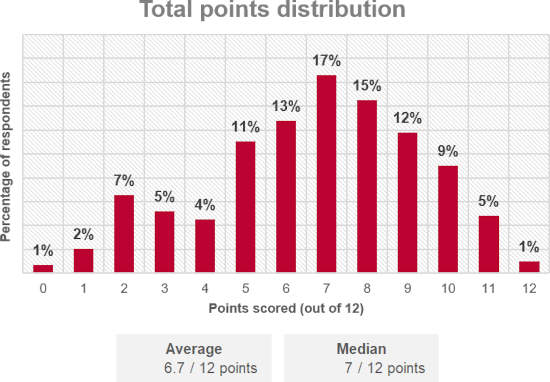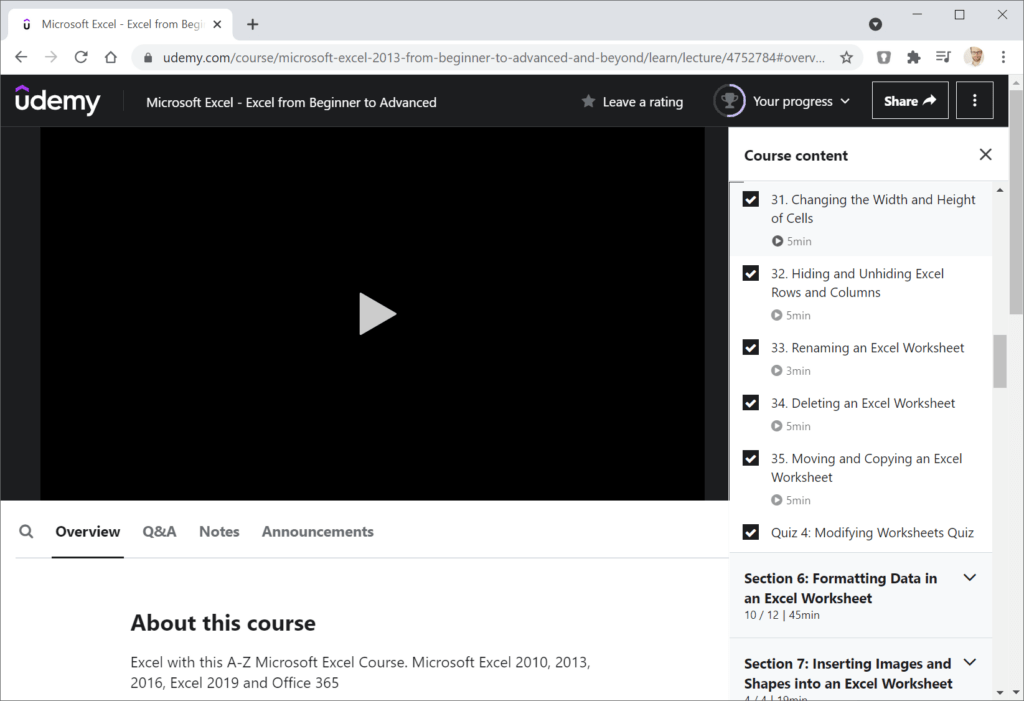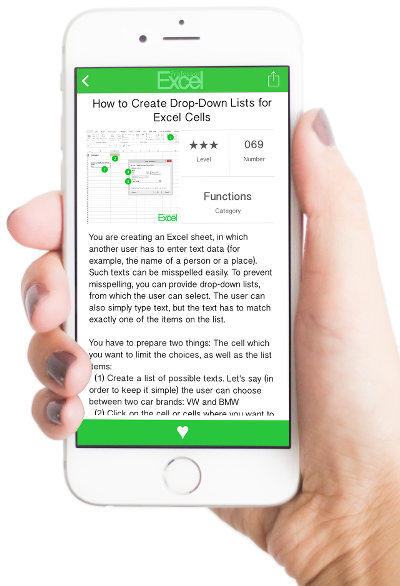Many people spend long hours each day in front of Excel. But unlike an athlete they don’t try to improve their Excel skills. Regular training should be something any professional does, right? If you look at ballet dancers, for example, what do you guess how much time do they spend on training?
At the same time, one of the questions I’m most frequently asked is: “How can I improve my Excel skills?”. Well, there is no general path or overall approach. But during the years I have collected some advice.
That is why I have created this article: My personal “Top-7” of how to improve your Microsoft Excel skills. Most things on this list should be common sense when you want to deepen some skills. The point is: You need to get started. So, why don’t you start today? Like, literally today?
Introduction
Excel is one of the most used office applications. At the same time, it’s one of the most complex programs and that leads to errors and inefficiencies. That said – and considering that you are reading this article – it’s time to improve your Excel skills.
The majority of people coming to my website has already some previous knowledge of Excel: My Excel quiz has resulted in the following numbers:

Looking at these results of this survey (which of course is not based on any science…) I get the impression that most users already know some basics. But there usually seems a lot of room for improvement. So, let’s take a look at the things you could do to boost your Excel skills!
1. Start by playing around and solve problems yourself
As said in the introduction, most users reading this article already have some previous knowledge. Therefore, you might have done this already: “Playing” around in Excel, trying to solve things by yourself. As trivial as it sounds: Solving problems yourself is a very important step in your “Excel career”. All the following advice won’t really work if you don’t try and incorporate them into your Excel life.
The goal is not to learn each and every Excel function but to learn to apply the things you need – by yourself. So, instead of googling things right away or asking people for help, why don’t you try to solve the problem yourself first?
2. Take an online class to improve your Excel skills
I have just recently done this: I have taken an online Excel class. Not, that I don’t trust my Excel skills but I wanted to make sure to eliminate some blind spots that might have developed over the years.
There are some great classes available, just google them. If you want my personal recommendation: I have been quite happy with this Excel class (which is for new joiners of Udemy usually between 10 and 20$ – I don’t receive anything for promoting it here, just mentioning), but there are many others available. Just search for it.

The advantage of these classes is that you are not in a hurry: You can always pause and rewind, do the exercises in your own time and so on. On the other hand, they require some level of self-discipline to not only start but really go through with them.
3. Asking colleagues, co-workers and friends improves your skills
My experience: In every team, group, department or company is someone who is known for her or his Excel skills. What about asking him or her for advice?

But please keep in mind: This person might receive lot of Excel related questions.
Another way to use the knowledge of co-workers could be to examine their Excel files. How are they built? Is there anything you could copy? What does this person do differently?
Again, speaking from my own experience: Instead of asking open questions like “how do I do a VLOOKUP”, why don’t you do it like this:
- Try to solve technical questions yourself, for example using Google (see point 6 below). If you still haven’t succeeded, try the following: Instead of asking “How do I do a VLOOKUP”, you might ask “My VLOOKUP function returns #N/A. Do you have an idea, why?”
- Or – if you have taken a look at the “experts” Excel model – ask concrete questions concerning the Excel models. For example: “Why have you put variable xy on this sheet and not here?” or “Why have you used SUMIFS and not VLOOKUP in cell xy?”
4. Take an “offline” Excel training or Excel class to boost your Excel skills
Most companies have some kind of training budget. And I have seen many companies not using it or just spending a portion of it. That said, which company would deny an Excel training?
We have to differentiate three different types of Excel training classes:
- Group trainings
- Individual trainings
- Coachings
Let’s take a closer look at each of these three training forms.
Excel group trainings

Group trainings are usually organized by someone within your company – it can even be you. I have taught groups between three and 12 participants. Well, 12 participants should really be the maximum number, the fewer the better in terms of your personal outcome.
These trainings are usually between 1 to 5 days. The actual length and depth should be defined with you and the trainer. The advantages of these group training are that the training is based on your actual requirements. You can ask your questions and the speed adapts to you. Furthermore – in contrast to online trainings – you are done within these couple of days and the break off rate is much lower.
On the other side, costs are of course much higher than online trainings. Just to provide a reference: I estimate for a two-day training 2-4k EUR / USD. But these costs should include the fee for all participants. So, let’s say 3.000 EUR for 10 participants is 300 EUR per person. The opportunity costs (costs for your team taken off their work for 2 days) are often higher and should of course be considered. But bottom line: The payback period for such training is very short. From a business perspective an Excel training is usually worth within a couple of weeks.
In this context: Professor Excel provides Excel group trainings, as of now limited to the Northern Europe area. Just contact me and we can see if such training could be suitable for you.
Individual Excel trainings
If you don’t want to organize a training for your team, just Google a bit. There are specialized training companies in most bigger cities. They publish their training schedules, and you can just sign up to their next training.
I personally don’t have any experience with these trainings, but ratings seem ok. Prices vary, probably a quick comparison would be necessary.
Excel coaching

This is a special “training” form and usually not that widely spread. Coachings usually target Excel users with some previous knowledge. I, for example, offer Excel users to take a look at their Excel files once a while or help them to solve problems.
For such coaching we either have some fixed time contract (5h per month, etc.) or by actual effort. To my mind, such coaching only makes sense for a longer-term affiliation. The coach should get to know you, your requirements, and skills before actually giving advice.
One word of caution: There are some services around to answer simple Excel questions, even provided by Microsoft. I haven’t tried them, but they seem quite expensive to me. My impression is that these services might help to solve an urgent technical problem but don’t really help you to improve your skills. If you have any experience with these services, please feel free to leave a comment.
5. Stay up to date with newsletters and social media to passively learn Excel
This is an easy way to keep up and improve your Excel skills: E-Mail newsletters, social media or even apps. Of course, there are many interesting accounts around Microsoft Excel. I like the following accounts:
- “Mr. Excel” Bill Jelen: https://twitter.com/MrExcel
- Excel Easy: https://twitter.com/ExcelEasy
- Brian Jones, Head of Product Excel: https://twitter.com/jones206
- Power Spreadsheets: https://twitter.com/PSpreadsheets
- Excel Off The Grid: https://twitter.com/exceloffthegrid
- How to Excel at Excel: https://twitter.com/howtoexcelatex
- Leila Gharani: https://twitter.com/LeilaGharani
- And of course Professor Excel: https://twitter.com/professorexcel
Probably most of these accounts have a similar account on Facebook or LinkedIn. Should not be difficult to find…
Newsletters

- Chandoo.org (sign-up link: https://feedburner.google.com/fb/a/mailverify?uri=PointyHairedDilbert&loc=en_US)
- How to Excel Newsletter: https://www.howtoexcel.org/newsletter/
- And of course again: Professor Excel Newsletter
Apps

- iPhone App: Professor Excel’s Daily Tips
6. Google for alternative solutions – even if you know how to do something
Almost all Excel problems have been solved and explained somewhere on the internet. Googling it might help you with a particular problem. But let me encourage you: Don’t be shy to google Excel stuff. Also, do it when you have solved your Excel problem but have the feeling that there might be faster or better ways. When I write articles, I usually introduce more than 3 ways to do something in Excel – along with a recommendation.

7. Keep your mind open is the foundation of improving your Excel skills
This is probably the most important advice: Keep your mind open. Especially in such complex software like Microsoft Excel I would guess that you can always improve. Me, too – I also have my blind spots. Realizing that helps to continue and improve your Excel journey.
Image by Alexandr Ivanov from Pixabay


You don’t mention certifications if there are any that would at least give you something for the effort to improve skills.
Hi Steve,
Yes, that’s true, certificates would give you something for the effort. Certificates are a proof of your skills, no matter if you use it for your next job application or your own motivation to go on learning. When it comes to improving your skills most Excel users are already motivated by the prospect of saving a lot of time and increasing their work quality. So, for them a certificate would rather be something “on top”.
What do you think, does that make sense?
Best regards,
Henrik